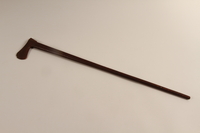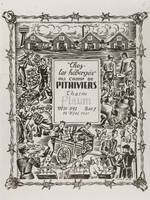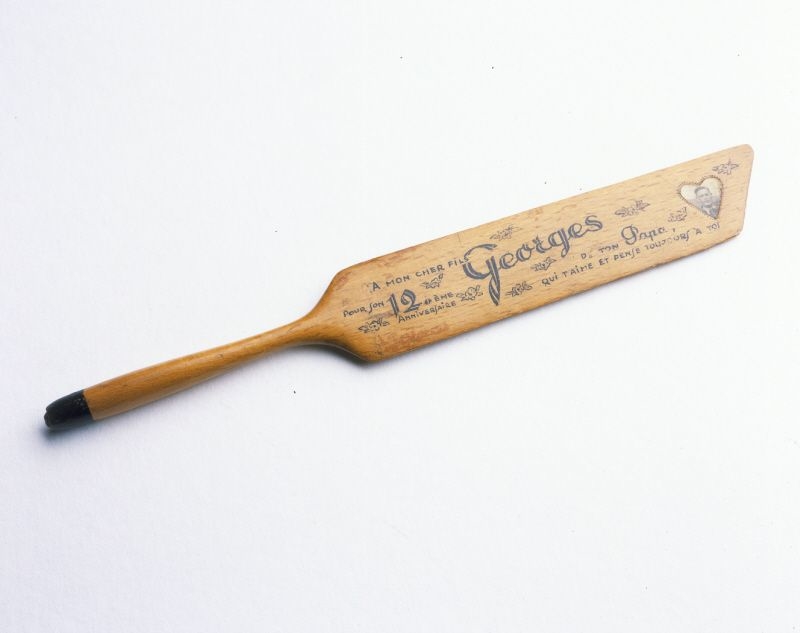Overview
- Brief Narrative
- Wooden quill shaped fountain pen given to Georges Flaum by his father, Charles, for his 12th birthday in 1942. It was made by another Jewish inmate, Isaac Schoenberg, at the internment camp in France where Charles was being held. The nib is a modern accessory. Georges lived with his parents, Charles and Therese, in Paris. In May 1940, France was invaded by Nazi Germany. The June armistice placed Paris under a German military administration which enacted anti-Jewish policies. On May 14, 1941, Charles was sent to Pithiviers internment camp. Georges and his mother were able to visit him there ca. 1942, around Georges's 12th birthday, when he received the woodcut, a fountain pen, and a walking stick. On July 26, 1942, Therese was arrested. She yelled to Georges to run and he escaped to the home of his maternal uncle, Max Hirszberg. Max’s Catholic wife Edmee helped Georges create a false identity as a Christian using his maternal grandmother’s name, Banet. He then lived in hiding with a series of families for the next two years. Paris was liberated in August 1944 and Georges returned to Paris. His parents had been deported in summer 1942 to Auschwitz, where they perished. In December 1946, Georges left for the home of a relative, Albert Banet, in America.
- Date
-
creation:
before 1942 June
received: approximately 1942 June
- Geography
-
creation:
Pithiviers (Concentration camp);
Pithiviers (France)
received: Pithiviers (Concentration camp); Pithiviers (France)
- Credit Line
- United States Holocaust Memorial Museum Collection, Gift of George Flaum Banet and Marlene Roberts Banet
- Contributor
-
Subject:
George Flaum Banet
- Biography
-
Georges Flaum was born on July 18, 1930, in Paris, France, to Charles (Chaim) and Therese (Tauba Hirszberg) Flaum. Charles was born in Rawa, Poland, and immigrated to France in December 1923. Therese was born in Czestochowa, Poland, and immigrated to France in January 1924. Charles was a tailor and Therese owned a shop. The couple married on April 5, 1927.
In May 1940, Nazi Germany invaded France. An armistice was signed in June and Paris and the northern and western regions were placed under German military administration. This included an SS run Jewish Affairs office which enacted policies that restricted Jewish persons, especially foreign born residents. On May 14, 1941, Charles was ordered to report to the police station in Paris. Because he was not a native Frenchman, he was sent to Pithiviers internment camp near Orleans. Therese and Georges managed to visit him at the camp. During the visit, Charles gave Georges presents made at the camp for his twelfth birthday: an engraved fountain pen, a woodcut, and a walking stick. In June 1942, an order was issued requiring all Jews over the age of six to wear Star of David badges on their clothing at all times. On July 16, 1942, gendarmes came to arrest Therese during the mass Vel D’Hiv roundups. As she was being taken into custody, Therese, as well as one of the French police, yelled to Georges to run away. Georges escaped and went to live with his maternal uncle and his wife, Max and Edmee Hirszberg (later Baney), in Paris. Edmee was Catholic and helped Georges assume a false identity as a Christian under the name of his maternal grandmother, Banet. For the next two years, Georges was hidden by several families in L'Hay les Roses, Chateauroux, Avranches, and the Evreux region, and attended Catholic school.
In summer 1944, he returned to his aunt and uncle in Paris, which was liberated in August 1944. The war ended when Germany surrendered in May 1945. Georges waited every day at the train station for his mother to return, but she never arrived. He continued to wait until he left for America. Georges eventually learned that both of his parents had been killed in Auschwitz. On June 25, 1942, Charles was deported from Pithiviers on convoy #4 to Auschwitz concentration camp, registered as prisoner 42010, and he was killed there on September 1, 1942. Therese was interned in Drancy and then deported to Auschwitz on convoy #12 on July 29, 1942, and was killed on September 3, 1942. In December 1946, Georges left France to go live with a relative, Albert Banet, in Philadelphia. He changed his name to Banet. Georges’ first marriage ended in divorce. He later married Marlene Roberts. George, 85, died on May 20, 2015, in Florida.
Physical Details
- Language
- French
- Classification
-
Office Equipment and Supplies
- Category
-
Writing materials
- Object Type
-
Fountain pens (lcsh)
- Physical Description
- a. Wooden fountain pen carved in the shape of a quill. On one side is a dedication with floral accents in blue ink and a small heart-shaped photograph of Charles Flaum. The other side has a small drawing of the camp and Souvenir de PITHIVIERS 1941-42.
b. Modern nib. - Dimensions
- a: Height: 9.875 inches (25.083 cm) | Width: 1.250 inches (3.175 cm) | Depth: 0.500 inches (1.27 cm)
b: Height: 0.375 inches (0.953 cm) | Width: 1.625 inches (4.128 cm) | Depth: 0.125 inches (0.318 cm) - Materials
- overall : wood, metal, paint, ink, adhesive, gelatin silver print
- Inscription
- front, blue ink : A mon fils Georges / pour son 12.ème anniversaire / de ton Papa / qui taime et pense toujours à toi [To my son Georges for his 12th birthday from your Papa who loves and thinks of you always]
Rights & Restrictions
- Conditions on Access
- No restrictions on access
- Conditions on Use
- No restrictions on use
Keywords & Subjects
- Topical Term
- Concentration camp inmates--Poland--Oswiecim--Biography. Hidden children (Holocaust)--France--Biography. Holocaust, Jewish (1939-1945)--France--Personal narratives. Jewish children in the Holocaust--France--Biography. Jews--Persecution--France--Paris--Biography. World War, 1939-1945--Prisoners and prisons, German--Personal narratives.
Administrative Notes
- Legal Status
- Permanent Collection
- Provenance
- The wooden fountain pen was donated to the United States Holocaust Memorial Museum in 1999 by George Flaum Banet.
- Funding Note
- The cataloging of this artifact has been supported by a grant from the Conference on Jewish Material Claims Against Germany.
- Record last modified:
- 2022-07-28 18:32:35
- This page:
- https://collections.ushmm.org/search/catalog/irn13574
Download & Licensing
In-Person Research
- By Appointment
- Request 21 Days in Advance of Visit
- Plan a Research Visit
- Request to See This Object
Contact Us
Also in George Flaum Banet and Marlene Roberts Banet collection
The collection consists of a walking stick, a quill pen, and a woodcut relating to the experiences of Georges Flaum (later Banet) and his parents Charles and Therese in France during and after the Holocaust, which Georges survived in hiding, while his parents were held in internment camps in France, and then deported and killed in Auschwitz concentration camp in German occupied Poland.
Date: approximately 1942

Walking stick received as a gift by a French Jewish boy who survived in hiding
Object
Walking stick which Georges Flaum received from his father Charles for his 12th birthday in 1942 during a visit to the internment camp where Charles was being held. Georges lived with his parents, Charles and Terese, in Paris. In May 1940, France was invaded by Nazi Germany. The June armistice placed Paris under a German military administration which enacted anti-Jewish policies. On May 14, 1941, Charles was sent to Pithiviers internment camp. Georges and his mother were able to visit him there ca. 1942, around Georges's 12th birthday, when he received the woodcut, a quill, and a walking stick. On July 26, 1942, Therese was arrested. She yelled to Georges to run and he escaped to the home of his maternal uncle, Max Hirszberg. Max’s Catholic wife Edmee helped Georges create a false identity as a Christian using his maternal grandmother’s name, Banet. He then lived in hiding with a series of families for the next two years. Paris was liberated in August 1944 and Georges returned to Paris. His parents had been deported in summer 1942 to Auschwitz, where they perished. In December 1946, Georges left for the home of a relative, Albert Banet, in America.

Woodcut of camp life made for the son of a transit camp inmate by another inmate
Object
Woodcut which Charles (Chaim) Flaum gave to his son Georges for his 12th birthday ca. 1942. It was made by another inmate, Arthur Weisz, at the internment camp where Charles was being held and has images of daily life at Camp Pithiviers. Georges lived with his parents, Charles and Therese, in Paris. In May 1940, France was invaded by Nazi Germany. The June armistice placed Paris under a German military administration which enacted anti-Jewish policies. On May 14, 1941, Charles was sent to Pithiviers internment camp. Georges and his mother were able to visit him there ca. 1942, around Georges's 12th birthday, when he received the woodcut, a quill, and a walking stick. On July 26, 1942, Therese was arrested. She yelled to Georges to run and he escaped to the home of his maternal uncle, Max Hirszberg. Max’s Catholic wife Edmee helped Georges create a false identity as a Christian using his maternal grandmother’s name, Banet. He then lived in hiding with a series of families for the next two years. Paris was liberated in August 1944 and Georges returned to Paris. His parents had been deported in summer 1942 to Auschwitz, where they perished. In December 1946, Georges left for the home of a relative, Albert Banet, in America.




